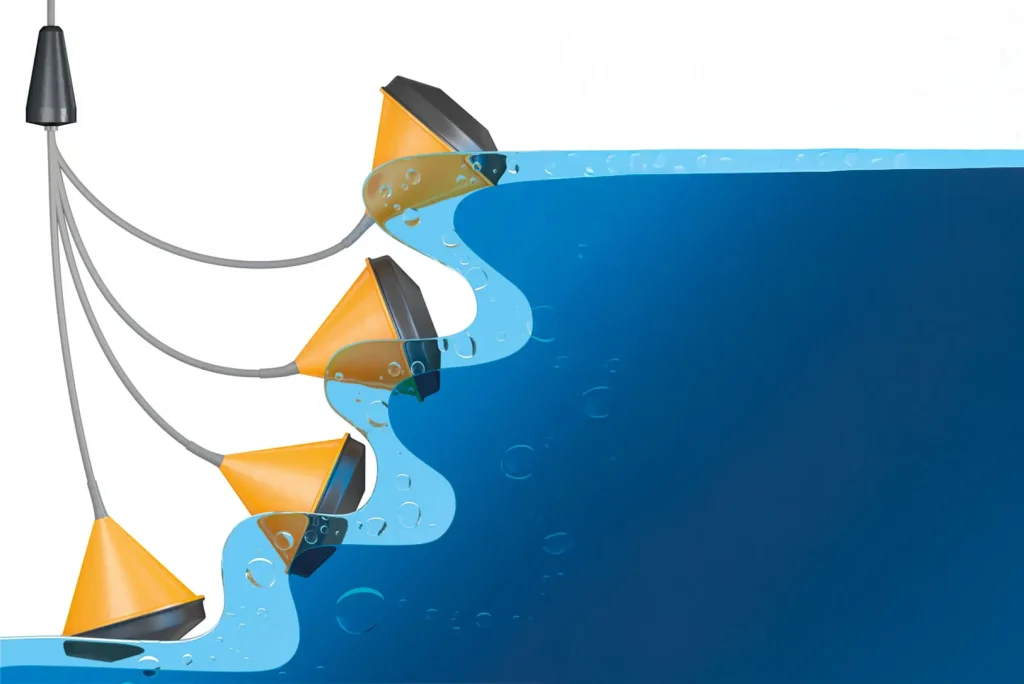Float switches are commonly used in a variety of applications, ranging from monitoring water levels to controlling machinery. They work by detecting the level of liquid at a given point and triggering an action when that liquid reaches a certain threshold. Float switches are available in different shapes and sizes, depending on the needs of the application.
What is a Float Switch?
A float switch is a type of sensor that uses a buoyant object, typically an enclosure filled with air or liquid, to detect the level of liquid at a given point. This buoyant object is referred to as the “float” and is connected to a contact closure or reed switch. When the float rises or falls due to changes in the liquid level, a contact closure or reed switch opens or closes depending on the direction of movement. These electrical signals can then be used to control a variety of functions such as pumps, alarms, and other types of machinery.
KA Switch
One Kari float can accommodate up to four switch points in a single float, offering cost savings by replacing four single-level float switches. The sensors are long-lasting, highly compatible with chemicals, and are available in 25 configurations, with most including built-in hysteresis.
-
-
Built Better
Kari Series float switches boast excellent chemical compatibility, robust cable choices, and long-lasting components that outperform the competition.
-
Level Control
A single Kari Series float switch can take the place of four individual single-level float switches. Achieving the same functionality with just one float means cost savings, hassle-free operation, and successful completion of the task.
-
Non-Toxic
You can be confident that these float switches do not contain any lead or mercury.
-
FLX/FLE Float Switch Series
The FLX and FLE float switch series is a multipoint liquid-level sensing solution designed to meet the needs of a wide variety of applications. This float switch utilizes an array of switch points. When the liquid reaches the level of a switch point, it will trigger the associated action.
-
-
FLX
- Class 1, Divisions 1 and 2
The FLX Series Level Switch is designed as a float switch suitable for hazardous locations, specifically those categorized as Class I, Division 1, or 2 areas according to CSA standards for North America. - Configuration Options
Select the optimal switch point configuration based on your requirements. Decide between using the Normally Closed or Normally Open option for each switch point along the stem.
- Class 1, Divisions 1 and 2
-
FLE
- Customizable
FL Series multi-point level switches are customizable products tailored to your specific requirements. You can customize switch configurations, float types, and materials for every FLE and FLR switch. - Works in Tight Spaces
Unlike float switches that are suspended and require ample space to operate, this vertical float switch operates along a probe or stem, allowing for precise level measurement in cramped spaces.
- Customizable
-
FS Series
The FS series of float switches are specially designed for high accuracy and reliability. This family of float switches includes the FS500, FS410, and FS400. The FS500 is designed to be used in industrial applications, while the FS410 and FS400 are designed for use in water treatment systems. Each of these float switches utilizes a buoyant mechanism that senses the liquid level and triggers an action when it reaches a certain threshold.
-
-
FS-400
- Compact Size
From the uppermost point of the mounting threads down to the stem’s base, the FS-400 measures less than 3.5 inches in length, and the float spans slightly over 2 inches in width. - Temperature Ranges
The FS-400-S can operate in temperatures ranging from -40° to 368°F (-40° to 187°C), while the FS-400-HT offers an extended range of -40° to 500°F (-40° to 260°C)!
- Compact Size
-
FS-410
- Compact Size
Measuring from the uppermost mount threads to the lower end of the stem, the FS-410 spans less than 2.35″ in length, with the float measuring slightly under 1.2″ in width. - Temperature Ranges
The FS-410-S can operate in temperatures ranging from -40° to 368° F (-40° to 187° C), while the FS-410-HT expands that range to -40° to 500° F (-40° to 260° C).
- Compact Size
-
FS-500
- Three Mounting Options
Select from options such as dual 1/2″ NPTM connectors, 1/2″ NPTM and 1/4″ NPTM connectors, or Bulkhead mount with 1/2 – 13 threads. - CSA And NSF Approvals
CSA Explosion Proof certification is given to Standard Temperature switches with dual-NPTM mounts, while General Use approval is granted to Bulkhead mount switches and High-Temperature models. Additionally, every FS-500 float switch complies with NSF 169.
- Three Mounting Options
-
Float switches are an invaluable asset in many industries due to their reliability and versatility. By understanding how a float switch works and the different types available, you can ensure that your application will perform as expected. Whether you’re looking for a food-grade float switch or one designed for industrial use, there is sure to be an option that meets your needs.
Float switches can be used in applications that involve liquid. By understanding the specific requirements of your application, you’ll be able to choose the right switch for your needs. Float switches are an invaluable resource for monitoring liquid levels and ensuring accuracy across a range of applications. With many options available on the market today, it’s easy to find a float switch that meets your needs.
For application-specific inquiries, please contact our application specialists.


